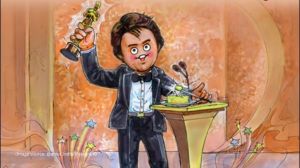Tale of the fundamental unit of life, told by a master storyteller
Siddhartha Mukherjee’s latest work of nonfiction, The Song of the Cell: An Exploration of Medicine and the New Human, takes off from the study of the fundamental unit of life — the cell — and leads the reader through the integral role it plays in medical science.
 Siddhartha Mukherjee at Express Adda; his book, The Song of the Cell.
Siddhartha Mukherjee at Express Adda; his book, The Song of the Cell. The Emperor of All Maladies: A Biography of Cancer (2010) that fetched him a Pulitzer, examined cancer with a “cellular biologist’s precision”, capturing the quest for a cure, while The Gene: An Intimate History (2016) took his family history to tell the story of what he calls “the birth, growth, and future of one of the most powerful and dangerous ideas in the history of science”.
New York-based oncologist, researcher, and author Siddhartha Mukherjee’s latest work of nonfiction, The Song of the Cell: An Exploration of Medicine and the New Human, takes off from the study of the fundamental unit of life — the cell — and leads the reader through the integral role it plays in medical science.
A chronicle of the discovery that all organisms are made of elementary particles, it’s a story, Dr Mukherjee says, of the way cells “enable profound forms of physiology: immunity, reproduction, sentience, cognition, repair, and rejuvenation”, and also of what happens when cells become dysfunctional, “tipping our bodies from cellular physiology into cellular pathology”.
“A hip fracture, a cardiac arrest, Alzheimer’s, dementia, AIDS, pneumonia, lung cancer, kidney failure, arthritis, COVID — all could be viewed as the results of cells, or systems of cells, functioning abnormally,” Dr Mukherjee writes. “And all could be perceived as loci of cellular therapies,” he says.
The discovery of cells — and the reframing of the human body as a cellular ecosystem — announced the birth of a new kind of medicine based on the therapeutic manipulations of cells. The ‘New Human’ in the title of his book is not then, a creature of science fiction, “a Keanu Reeves in a black muumuu but…a human being rebuilt anew with modified cells who looks and feels (mostly) like you and me.”
Dr Mukherjee, also an assistant professor of medicine at Columbia University who has demystified and humanised public discourse on medicine and health with his luminous writing, shows how cells are being repurposed as tools to fight illness. He shows both the reach of cellular manipulation and also its limitations, illustrated by the stories of Sam P, a sportswriter who fell to his melanoma, and Emily Whitehead, a young girl who made a remarkable recovery — “two new humans, examples of cellular manipulation and reengineering”.
Like the author’s previous works that led us through the past, present, and future, where the now flowed from a then, where personal stories intersected with scientific ones, The Song of the Cell is lit with a range of references. Not just scientists, but philosophers and poets too find mention as ancient ideas funnel into modern debates.
Questions of what we are made of and where we come from occupied philosophers from Aristotle to the 13th century German friar Albertus Magnus. From the 17th century Dutch cloth merchant Antonie van Leeuwenhoek who trained a microscope that he used to examine textile fibres on a droplet of water, to English polymath Robert Hooke who observed “little boxes” when he put a thin slice of cork under a microscope, to Prussian physician Rudolf Virchow who showed that cells divide and beget new cells, The Song of the Cell chronicles the evolving study of cells.
Divided in six parts, the book eschews a chronological order to tell its story — as Dr Mukherjee says, “the structure is cellular, if you will”.
The medical mysteries of Covid-19 sit at the centre of this book, because, writes Dr Mukherjee, cell biology sits at the centre of medical mysteries. The book explores the interaction of SARS-CoV-2 with our cells that enabled the virus to unleash the global pandemic, and looks into research that points to the possible reasons that some people contracted severe disease while others didn’t.
Even with his deep knowledge of the immune system (Dr Mukherjee has been working on immunological cures for cancers), SARS-CoV-2 caught him and other scientists by surprise.
“In the early winter of 2020, before our self-assuredness was upended, it seemed as if the immune system, of all the complex cellular systems in the body, was the one we understood the best…And then, biblically, we tumbled,” he writes. “The pandemic demands autopsies of many kinds, but an autopsy of our knowledge about cell biology is also necessary.”
The advancements and the failures, the past and the future, The Song of the Cell captures them all. And, if this is the Age of the Cell, then there is perhaps no one better than Siddhartha Mukherjee to walk us through it.
Title | The Song of the Cell: An Exploration of Medicine and the New Human
Author: Siddhartha Mukherjee
Publisher: Penguin Allen Lane
Pages: 576
Price: Rs 799



- 01
- 02
- 03
- 04
- 05



































